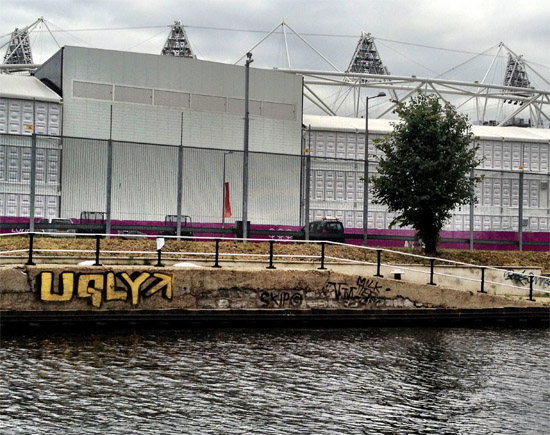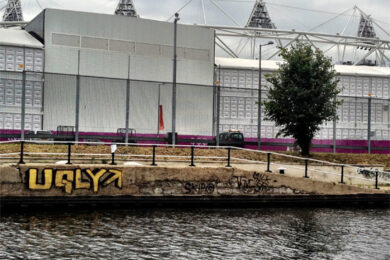I work for one of London’s 33 local authorities. As everyone knows, the Olympics are coming to town. The message coming from the top down is that London must prepare for the ‘Greatest Show on Earth’. David Cameron promised the International Olympics Committee (IOC) "great sport, great culture, great business and great legacy for Britain". Naturally, this work has been passed out to the local authorities that have had to deliver more projects with less money. Cuts of up to £50m for each of the boroughs – cuts initiated by George Osborne and approved by Cameron – have been set in place as targets for 2012–2013. The London Organising Committee of the Olympic and Paralympic Games (LOCOG) have said that 2012 ends early. What does that mean? It means that as soon as the Paralympics close down in September, this enormously expensive party during a supposed period of austerity is over.
Cameron’s cohort Boris Johnson recently unveiled the Olympic rings which announce that the Games are just a month away. The interlocking rings hang over Tower Bridge and cost around £300,000 to produce and install. They are the iconic image of the Olympics themselves – yet no-one but those approved by the Olympic Committee is allowed to use them. This heavy-handed approach to branding led to the Inspire Mark being created. Around 2,700 events around the UK have been approved to use this mark.
LOCOG Chairman Lord Coe has called on London to join in the Games: "From the Queen’s Diamond Jubilee celebrations which continue, to the Torch Relay, the London 2012 Festival and the sporting events at the Games, we want everyone to join in."
The demand on us, in our small team, to produce events with scarce funds is not exactly fanned by the knowledge that our team is scheduled to be cut in 2013 (Croydon and Barnet have already been drastically hit). Osborne’s massive cuts to the arts last year means that the Arts Council will see a 50% reduction in funding. The Department for Culture Media & Sport (DCMS) said it was "disturbed by the number of local authorities coming forward proposing very substantial cuts, which inevitably will mean the end for a number of local arts institutions and arts events".
I have noticed that LOCOG are placing stricter demands on what community groups can and cannot do under the banner of the Olympics. If you were in any doubt of who is ‘core funding’ the London Games, the largest players are: Adidas, Lloyds TSB, BMW, British Airways, BT and BP. Global partners include McDonald’s, Coca-Cola and Samsung. That is why the largest McDonald’s restaurant ever built will reside in London’s Olympic Stadium and serve over £3m worth of fast food during the month of the Games. There are no more than 50 partners, supporters and providers providing the finance for London 2012, yet ticket sales alone would not have accounted for the billions of pounds required to put the Games on. The current estimated cost is around £11bn, rising to a projected £13bn. This makes London 2012 the most expensive Games ever to have been put on. Could the Games turn a profit? Unlikely.
Earlier this year, Meredith Alexander from ActionAid resigned her voluntary post as 2012’s sustainability watchdog. Dow Chemical are sponsoring a £7m fabric wrap for the Olympic Stadium, and the organisation has been unable to shake off links to the 1984 Bhopal gas leak disaster that claimed 3,000 lives in its immediacy and has affected over half a million. Despite 21 Indian Olympic athletes calling for the Dow sponsorship to be scrapped, Lord Coe has defended the tie, stating: "I am satisfied that the ownership, operation and the involvement either at the time of the disaster or at the final settlement was not the responsibility of Dow." But as Meredith Alexander notes, "The Olympic values are all about celebrating our common humanity. But the Olympics is also big business. There is an expensive machine behind the Games that is funded by corporate sponsors. Sadly when these sponsors are selected, money talks much more loudly than values." (Visit Greenwash Gold for a full brief on all the Olympic Partners.)
With such large amounts of money being spent, it is perhaps inevitable that the marketing and branding of the Games has become so possessive. As the Olympic flame makes its way around the country under the banner of the torch relay, we have come under strict instruction that no logos other than those of core partners and sponsors should be seen. Yet we have also been tasked with provision of ‘free entertainment’ provided by the community. Why would the arts groups want to perform voluntarily? Because this is a ‘once in a lifetime’ opportunity and there is no money to pay them. What do they get out of this? They can, under no circumstance, be affiliated with the Olympics; there can be no other logos or banners visible along the route. This rule doesn’t just apply to the Torch Relay – it applies to all events that come under the umbrella of the Olympics and Jubilee celebrations.
A number of documents available from london2012.com explain why protecting their brand is so important: "The London 2012 brand is our most valuable asset and we must protect its value to ensure we can fund the staging of the Games in 2012. But we have also been entrusted with protecting the long-term value of the Olympic and Paralympic brands."
But what about the key term in all this: legacy? What legacy the 2012 Olympics leave? The Games are being touted as benefiting London’s communities. David Cameron might like to shoehorn this into his strategic ‘Big Society’. Young people, sport, and employment are all cited by LOCOG as things that could be ‘transformed’ by the presence of the Games in London. But the pressure on local authorities to make savings at this time has had some dramatic results – moving families on housing benefit out of London for example. Or how about the £900m cut to care for the elderly and disabled?
A few months ago, I was contacted by the Musician’s Union (MU). It had been brought to their attention that some of their professional members were being asked by local authorities to perform for free. Wherever possible, I will pay community artists for a performance – even if it is a nominal amount to cover their expenses – but I will always pay professional musicians their wage. The MU is currently investigating LOCOG for attempting to wrangle free performances from professional musicians at the Games. The union’s Assistant General Secretary, Horace Trubridge, is already on record saying, "LOCOG have repeatedly told us that all professional musicians will be paid, and yet we’ve seen example after example of them breaking their word. If they want musicians to entertain thousands of people then they should pay for it."
In 2012, artists continue to be devalued. Once, art had the power to reflect what was happening in contemporary society, and this information could be used to present individual interpretations to large audiences in a way they may not have experienced before. Our current government is systematically removing that voice – a voice that is needed more than ever. London 2012 is a time when the world’s media will be pointing cameras at the city, so what better time will there be to take action?
Local government has a duty to its public. If a local councillor receives complaints about services, I guarantee he or she will contact the relevant department for an immediate response. These responses can, and do, bring about change to policy in local government. Operating on this local level, a real change can result. There’s no point in complaining about the Olympics in the vacuum of social networks – perhaps even writing this article is pointless. But the simple fact is, if you are unhappy and dissatisfied with the dominance, prevalence and impact of what London 2012 threatens to bring, there is plenty you can do about it.
The art of influencing
Don’t be afraid to complain. If you want to defend your services, make yourself heard, or just make authorities work harder, there are ways you can do so. (I’ve focused primarily on London here, but all these strategies can employed nationally.)
They Work For You: find out who your MP is, what their responsibilities are, how they voted on key issues, how to contact them and when to meet them at personal surgeries. Make sure they cover your postcode. They Work For You website
Write letters: emails are all well and good, but letters make an impact. It’s worth spending that 50 or 60 pence.
Here’s a clickable map of London that allows you to find a particular Local Authority. And here’s a national map that shows what fiscal cut has been made to each Local Authority.
Councillors: your local councillors work for specific departments and will work to get information about those departments for you. The more specific your enquiry, the better. They are keen to have your vote, so will work to get a response for you. Find your local councillor.
Freedom of Information: you have a right to know, but – again – be specific. How much money was spent on the Diamond Jubilee? What is that particular advertising campaign costing, and why do we need it? Find out more on Directgov or the ICO website.
Sadly LOCOG are a private company and not open to these requests, but that doesn’t stop you contacting the Olympic Delivery Authority (ODA).
Check out the queries being sent to the DCMS, who have a duty to report back on transparency. Then make your own.
You can complain direct to the Greater London Authority. They will be keen to pass you on to your local authority, but you can still contact them.
Is London 2012 sustainable? Find out more.



